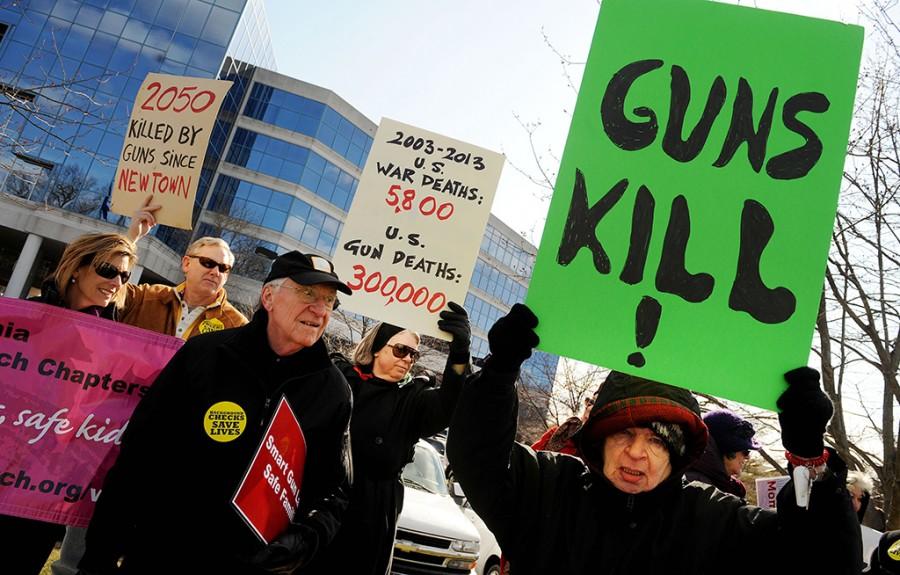In recent years, mass shootings have become an increasingly familiar sight to watch and read about on television news networks and in the paper. Public safety officials and schools are growing concerned about this apparent trend. MHS, for instance, now requires students to show their ID cards to gain entrance to the building.
While the public fears- and certainly, mass media suggests- that public shootings and copycats are becoming a more recurring spectacle, experts say that they are not, in fact, becoming more common.
“Without minimizing the pain and suffering of the hundreds who have been victimized in senseless attacks, the facts say clearly that [there] has been no increase in mass killings, and certainly no epidemic,” Dr. James Alan Fox, a professor of criminology at Northeastern University, said.
Still, gun-related crime is a problem that continuously comes up every time a mass shooting is discussed. The United States had five firearm-related homicides per 100,000 people in 2011, according to the United Nations, and still owns the most guns per capita, which in 2007 was a world record 88.8 firearms per 100 people according to data collected by The Guardian, and is now at a supple 90 firearms per 100 people, with Yemen in second with 58.2 firearms per 100 people.
Meanwhile, Switzerland, with 45.7 firearms per 100 people and the third highest rate of gun ownership, only had 0.5 homicides per 100,000 people in 2010 according to government figures. Finland, with 45.3 firearms per 100 people and number four in gun ownership, had 0.45 homicides per 100,000 people in 2007.
So why is it that the United States has a homicide rate just over six and a half times that of Finland, or nearly four times as high as Switzerland’s?
For one thing, Finland has gun control laws that supplement those of the European Union, prohibiting loaded guns from being carried in public except by police and security guards with closely defined working conditions, training, and a permit.
Extensive background checks in Finland are carried out in a uniform manner across the entire country, unlike the United States which has fragmented laws by state that limit the effectiveness of gun control. Moreover, to obtain a license to own a gun, the applying individual must present a valid reason to own a gun, where self-defense is not considered an acceptable reason. Hunters, hobbyists, professionals and collectors must present evidence supporting their reasons for obtaining a firearm as well.
For another, Switzerland, like the United States, has an ubiquitous gun culture where sharpshooting is considered a fun recreational activity and the right to bear arms is seen as necessary. Still, it has a very small rate of firearm-related crimes due to its gun culture.
Firearms are usually kept at home because of the belief that enemies could invade Switzerland — a very small country — very quickly. Thus, soldiers had to be ready and able to fight their way to their regiment’s assembly point, rooting their convictions in a sense of patriotic duty.
Moreover, responsibility and safety are beliefs that are heavily anchored in Swiss society and are passed from generation to generation, with kids as young as twelve years old joining gun clubs to learn sharpshooting and gun safety.
“Social conditions are fundamental in deterring crime,” Peter Squires, a professor of criminology and public policy at the University of Brighton in Great Britain, said in an interview with TIME. “If people have a responsible, disciplined and organized introduction into an activity like shooting, there will be less risk of gun violence.”
To make any progress in reducing gun crime in the United States, action needs to be taken both in the chambers of our nation’s legislatures as well as in our own homes and communities. Loaded firearms should not be carried in public, and background checks for all firearm owners would also reduce the likelihood of mentally ill or violent individuals from obtaining them.
“Missouri’s 2007 repeal of its permit-to-purchase handgun law, which required all handgun purchasers to obtain a license verifying that they have passed a background check, contributed to a fourteen percent increase in Missouri’s murder rate,” researchers with the John Hopkins Center for Gun Policy and Research said in a news release.
Therefore, guns should not be seen as the only means of self-defense, and individuals should be taught, even from a young age, that they can be used responsibly for sharpshooting and hunting, instead of for self-defense and violence. Such a sense of social responsibility would reduce the need for gun ownership in the United States to come under fire.


